HR Lifecycle, Performance Management, and Legal Aspects in Hospitality
VerifiedAdded on 2023/01/19
|18
|6458
|57
Report
AI Summary
This report examines human resource practices within the hospitality industry, focusing on Marriott International. It explores the HR life cycle, including recruitment, education, motivation, evaluation, and celebration, and its impact on talent retention and development. The report develops a performance management plan, outlining stages such as planning, monitoring, developing, rating, and rewarding. It also addresses relevant employment and contract laws, assessing their influence on business decision-making. Furthermore, the report analyzes communication, coordination, and monitoring methods to achieve organizational objectives and strengthen the value chain, providing recommendations for improvement. Overall, the report provides a comprehensive overview of HR strategies and their implications within the hospitality sector, offering insights into talent planning and legal compliance. This report is contributed by a student and is available on Desklib, a platform providing AI-based study tools for students.
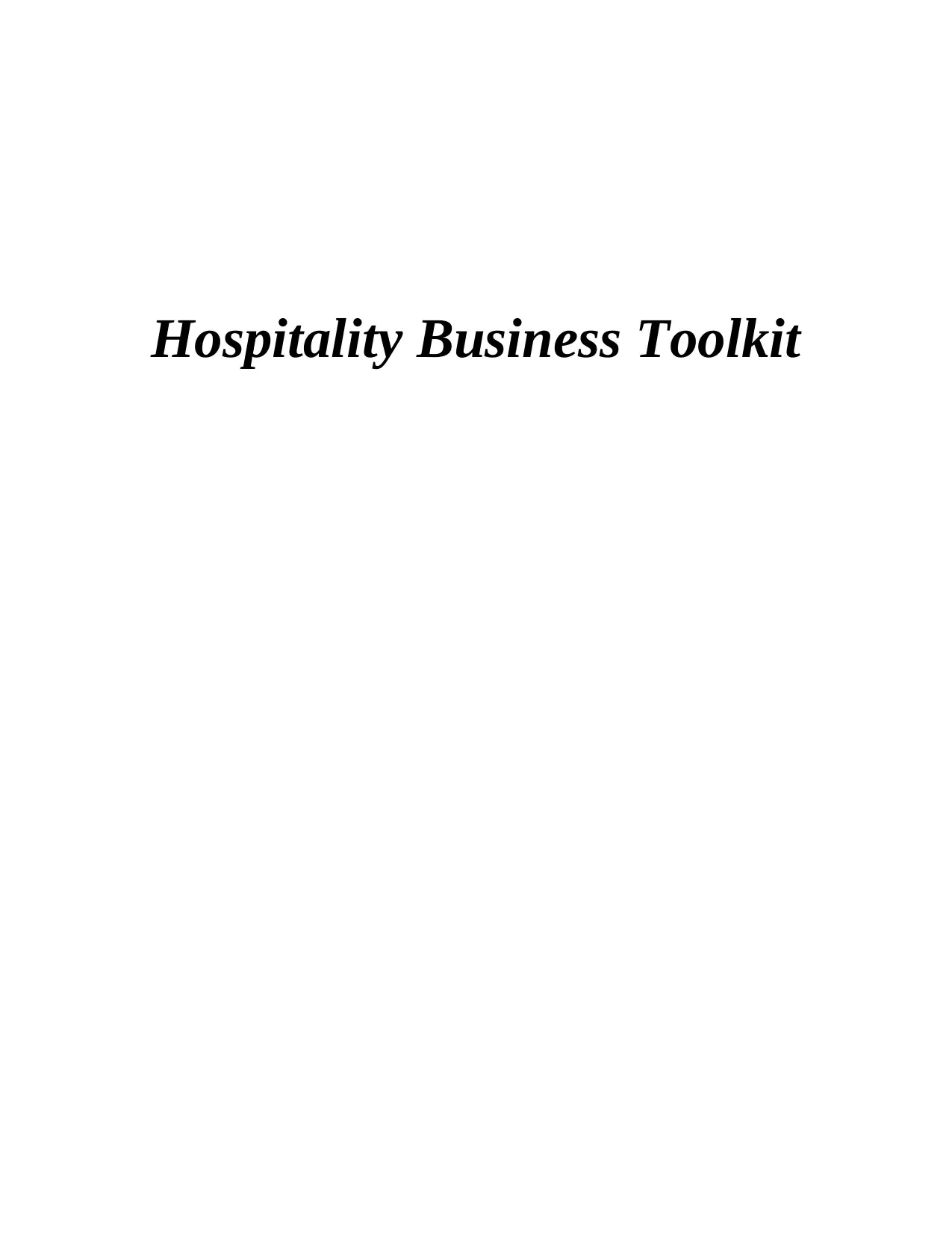
Hospitality Business Toolkit
Paraphrase This Document
Need a fresh take? Get an instant paraphrase of this document with our AI Paraphraser
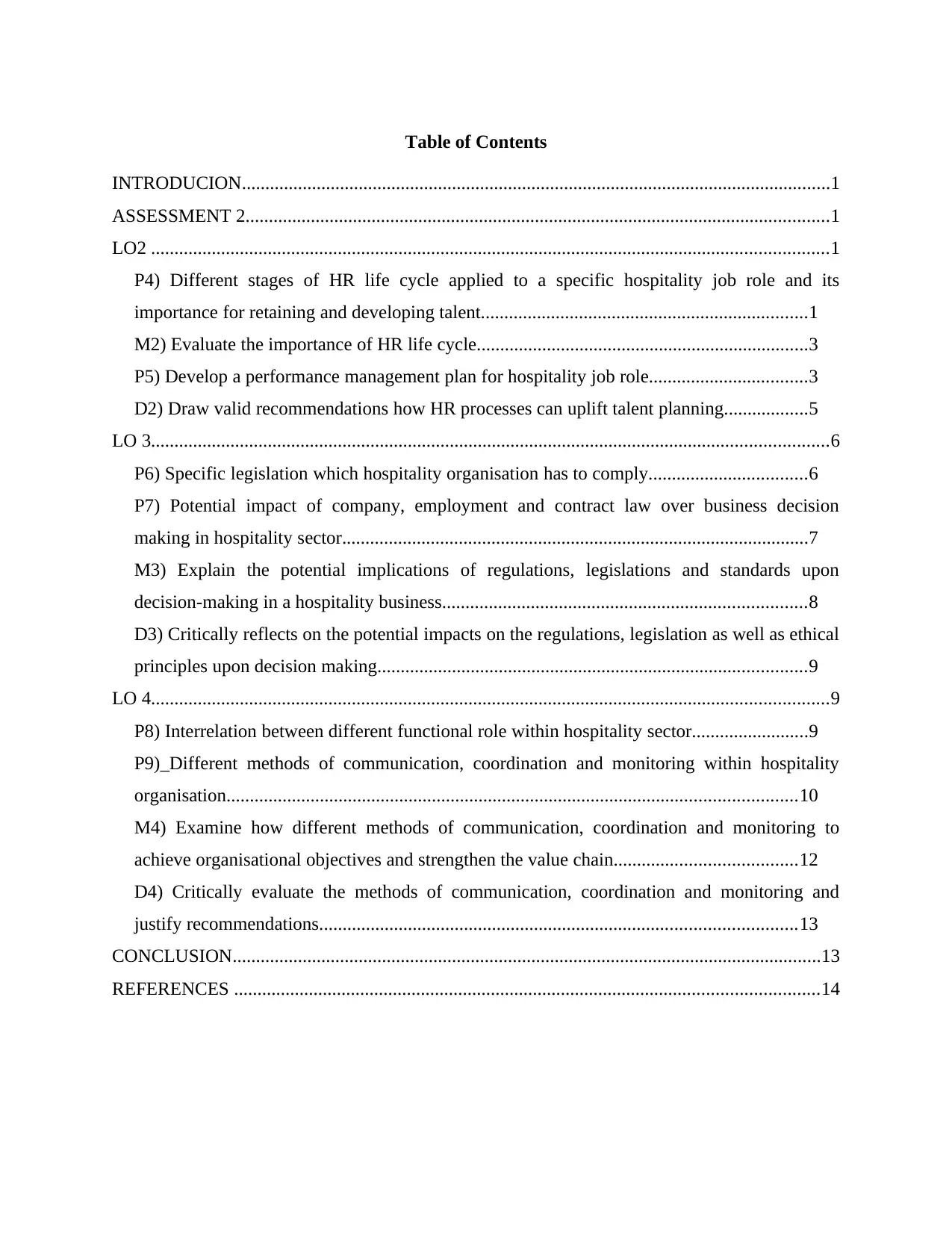
Table of Contents
INTRODUCION..............................................................................................................................1
ASSESSMENT 2.............................................................................................................................1
LO2 .................................................................................................................................................1
P4) Different stages of HR life cycle applied to a specific hospitality job role and its
importance for retaining and developing talent......................................................................1
M2) Evaluate the importance of HR life cycle.......................................................................3
P5) Develop a performance management plan for hospitality job role..................................3
D2) Draw valid recommendations how HR processes can uplift talent planning..................5
LO 3.................................................................................................................................................6
P6) Specific legislation which hospitality organisation has to comply..................................6
P7) Potential impact of company, employment and contract law over business decision
making in hospitality sector....................................................................................................7
M3) Explain the potential implications of regulations, legislations and standards upon
decision-making in a hospitality business..............................................................................8
D3) Critically reflects on the potential impacts on the regulations, legislation as well as ethical
principles upon decision making............................................................................................9
LO 4.................................................................................................................................................9
P8) Interrelation between different functional role within hospitality sector.........................9
P9)_Different methods of communication, coordination and monitoring within hospitality
organisation..........................................................................................................................10
M4) Examine how different methods of communication, coordination and monitoring to
achieve organisational objectives and strengthen the value chain.......................................12
D4) Critically evaluate the methods of communication, coordination and monitoring and
justify recommendations......................................................................................................13
CONCLUSION..............................................................................................................................13
REFERENCES .............................................................................................................................14
INTRODUCION..............................................................................................................................1
ASSESSMENT 2.............................................................................................................................1
LO2 .................................................................................................................................................1
P4) Different stages of HR life cycle applied to a specific hospitality job role and its
importance for retaining and developing talent......................................................................1
M2) Evaluate the importance of HR life cycle.......................................................................3
P5) Develop a performance management plan for hospitality job role..................................3
D2) Draw valid recommendations how HR processes can uplift talent planning..................5
LO 3.................................................................................................................................................6
P6) Specific legislation which hospitality organisation has to comply..................................6
P7) Potential impact of company, employment and contract law over business decision
making in hospitality sector....................................................................................................7
M3) Explain the potential implications of regulations, legislations and standards upon
decision-making in a hospitality business..............................................................................8
D3) Critically reflects on the potential impacts on the regulations, legislation as well as ethical
principles upon decision making............................................................................................9
LO 4.................................................................................................................................................9
P8) Interrelation between different functional role within hospitality sector.........................9
P9)_Different methods of communication, coordination and monitoring within hospitality
organisation..........................................................................................................................10
M4) Examine how different methods of communication, coordination and monitoring to
achieve organisational objectives and strengthen the value chain.......................................12
D4) Critically evaluate the methods of communication, coordination and monitoring and
justify recommendations......................................................................................................13
CONCLUSION..............................................................................................................................13
REFERENCES .............................................................................................................................14
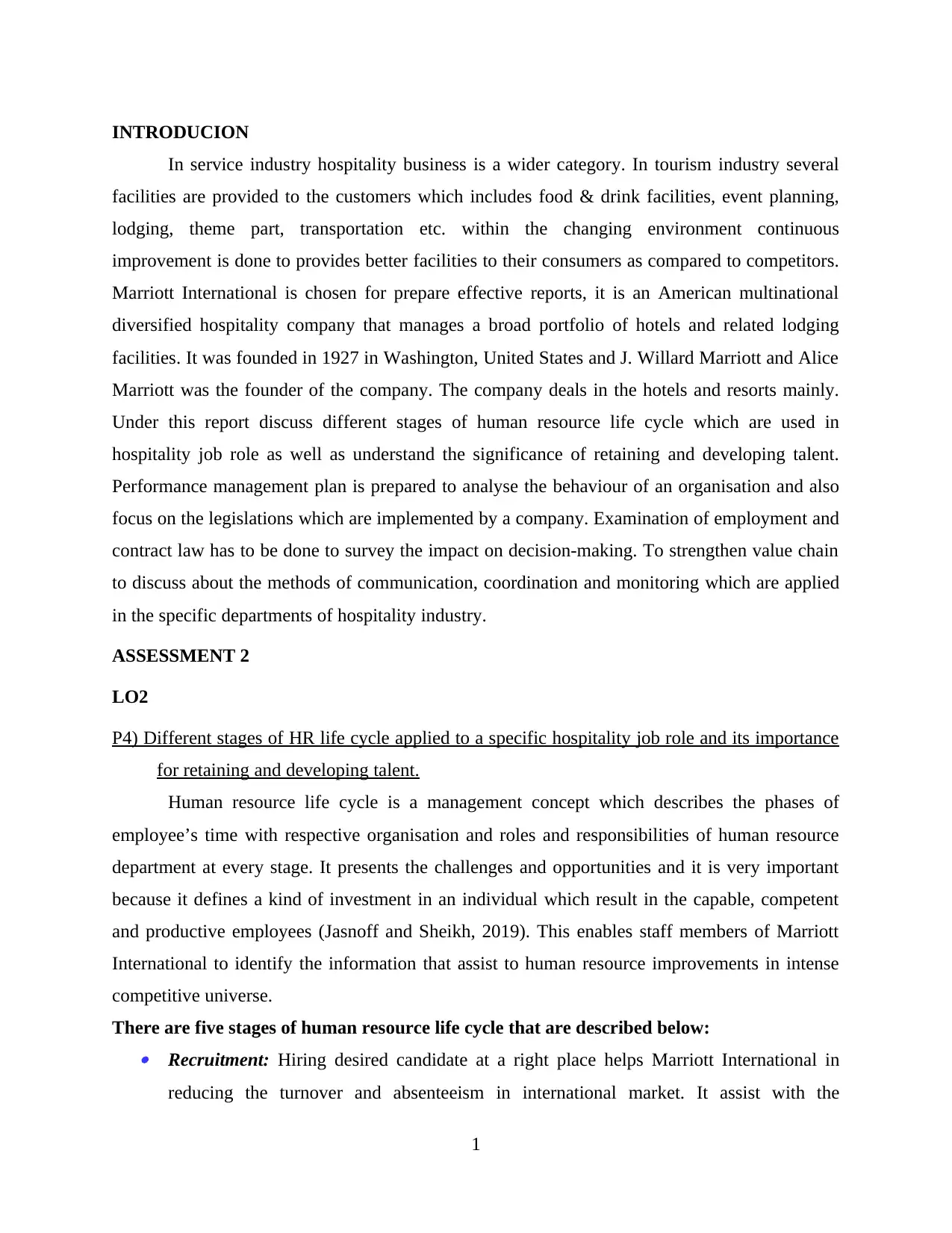
INTRODUCION
In service industry hospitality business is a wider category. In tourism industry several
facilities are provided to the customers which includes food & drink facilities, event planning,
lodging, theme part, transportation etc. within the changing environment continuous
improvement is done to provides better facilities to their consumers as compared to competitors.
Marriott International is chosen for prepare effective reports, it is an American multinational
diversified hospitality company that manages a broad portfolio of hotels and related lodging
facilities. It was founded in 1927 in Washington, United States and J. Willard Marriott and Alice
Marriott was the founder of the company. The company deals in the hotels and resorts mainly.
Under this report discuss different stages of human resource life cycle which are used in
hospitality job role as well as understand the significance of retaining and developing talent.
Performance management plan is prepared to analyse the behaviour of an organisation and also
focus on the legislations which are implemented by a company. Examination of employment and
contract law has to be done to survey the impact on decision-making. To strengthen value chain
to discuss about the methods of communication, coordination and monitoring which are applied
in the specific departments of hospitality industry.
ASSESSMENT 2
LO2
P4) Different stages of HR life cycle applied to a specific hospitality job role and its importance
for retaining and developing talent.
Human resource life cycle is a management concept which describes the phases of
employee’s time with respective organisation and roles and responsibilities of human resource
department at every stage. It presents the challenges and opportunities and it is very important
because it defines a kind of investment in an individual which result in the capable, competent
and productive employees (Jasnoff and Sheikh, 2019). This enables staff members of Marriott
International to identify the information that assist to human resource improvements in intense
competitive universe.
There are five stages of human resource life cycle that are described below: Recruitment: Hiring desired candidate at a right place helps Marriott International in
reducing the turnover and absenteeism in international market. It assist with the
1
In service industry hospitality business is a wider category. In tourism industry several
facilities are provided to the customers which includes food & drink facilities, event planning,
lodging, theme part, transportation etc. within the changing environment continuous
improvement is done to provides better facilities to their consumers as compared to competitors.
Marriott International is chosen for prepare effective reports, it is an American multinational
diversified hospitality company that manages a broad portfolio of hotels and related lodging
facilities. It was founded in 1927 in Washington, United States and J. Willard Marriott and Alice
Marriott was the founder of the company. The company deals in the hotels and resorts mainly.
Under this report discuss different stages of human resource life cycle which are used in
hospitality job role as well as understand the significance of retaining and developing talent.
Performance management plan is prepared to analyse the behaviour of an organisation and also
focus on the legislations which are implemented by a company. Examination of employment and
contract law has to be done to survey the impact on decision-making. To strengthen value chain
to discuss about the methods of communication, coordination and monitoring which are applied
in the specific departments of hospitality industry.
ASSESSMENT 2
LO2
P4) Different stages of HR life cycle applied to a specific hospitality job role and its importance
for retaining and developing talent.
Human resource life cycle is a management concept which describes the phases of
employee’s time with respective organisation and roles and responsibilities of human resource
department at every stage. It presents the challenges and opportunities and it is very important
because it defines a kind of investment in an individual which result in the capable, competent
and productive employees (Jasnoff and Sheikh, 2019). This enables staff members of Marriott
International to identify the information that assist to human resource improvements in intense
competitive universe.
There are five stages of human resource life cycle that are described below: Recruitment: Hiring desired candidate at a right place helps Marriott International in
reducing the turnover and absenteeism in international market. It assist with the
1
⊘ This is a preview!⊘
Do you want full access?
Subscribe today to unlock all pages.

Trusted by 1+ million students worldwide
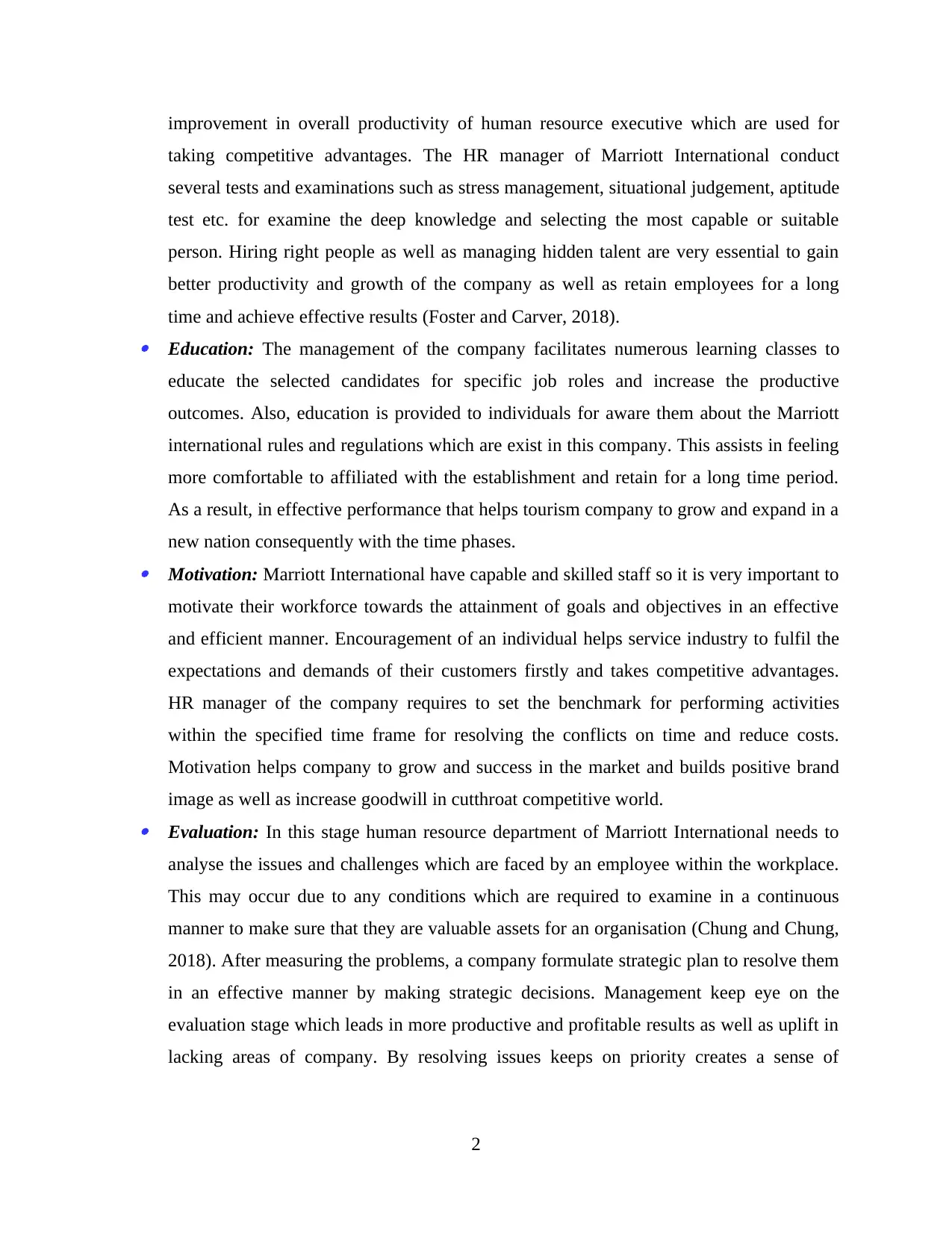
improvement in overall productivity of human resource executive which are used for
taking competitive advantages. The HR manager of Marriott International conduct
several tests and examinations such as stress management, situational judgement, aptitude
test etc. for examine the deep knowledge and selecting the most capable or suitable
person. Hiring right people as well as managing hidden talent are very essential to gain
better productivity and growth of the company as well as retain employees for a long
time and achieve effective results (Foster and Carver, 2018). Education: The management of the company facilitates numerous learning classes to
educate the selected candidates for specific job roles and increase the productive
outcomes. Also, education is provided to individuals for aware them about the Marriott
international rules and regulations which are exist in this company. This assists in feeling
more comfortable to affiliated with the establishment and retain for a long time period.
As a result, in effective performance that helps tourism company to grow and expand in a
new nation consequently with the time phases. Motivation: Marriott International have capable and skilled staff so it is very important to
motivate their workforce towards the attainment of goals and objectives in an effective
and efficient manner. Encouragement of an individual helps service industry to fulfil the
expectations and demands of their customers firstly and takes competitive advantages.
HR manager of the company requires to set the benchmark for performing activities
within the specified time frame for resolving the conflicts on time and reduce costs.
Motivation helps company to grow and success in the market and builds positive brand
image as well as increase goodwill in cutthroat competitive world. Evaluation: In this stage human resource department of Marriott International needs to
analyse the issues and challenges which are faced by an employee within the workplace.
This may occur due to any conditions which are required to examine in a continuous
manner to make sure that they are valuable assets for an organisation (Chung and Chung,
2018). After measuring the problems, a company formulate strategic plan to resolve them
in an effective manner by making strategic decisions. Management keep eye on the
evaluation stage which leads in more productive and profitable results as well as uplift in
lacking areas of company. By resolving issues keeps on priority creates a sense of
2
taking competitive advantages. The HR manager of Marriott International conduct
several tests and examinations such as stress management, situational judgement, aptitude
test etc. for examine the deep knowledge and selecting the most capable or suitable
person. Hiring right people as well as managing hidden talent are very essential to gain
better productivity and growth of the company as well as retain employees for a long
time and achieve effective results (Foster and Carver, 2018). Education: The management of the company facilitates numerous learning classes to
educate the selected candidates for specific job roles and increase the productive
outcomes. Also, education is provided to individuals for aware them about the Marriott
international rules and regulations which are exist in this company. This assists in feeling
more comfortable to affiliated with the establishment and retain for a long time period.
As a result, in effective performance that helps tourism company to grow and expand in a
new nation consequently with the time phases. Motivation: Marriott International have capable and skilled staff so it is very important to
motivate their workforce towards the attainment of goals and objectives in an effective
and efficient manner. Encouragement of an individual helps service industry to fulfil the
expectations and demands of their customers firstly and takes competitive advantages.
HR manager of the company requires to set the benchmark for performing activities
within the specified time frame for resolving the conflicts on time and reduce costs.
Motivation helps company to grow and success in the market and builds positive brand
image as well as increase goodwill in cutthroat competitive world. Evaluation: In this stage human resource department of Marriott International needs to
analyse the issues and challenges which are faced by an employee within the workplace.
This may occur due to any conditions which are required to examine in a continuous
manner to make sure that they are valuable assets for an organisation (Chung and Chung,
2018). After measuring the problems, a company formulate strategic plan to resolve them
in an effective manner by making strategic decisions. Management keep eye on the
evaluation stage which leads in more productive and profitable results as well as uplift in
lacking areas of company. By resolving issues keeps on priority creates a sense of
2
Paraphrase This Document
Need a fresh take? Get an instant paraphrase of this document with our AI Paraphraser
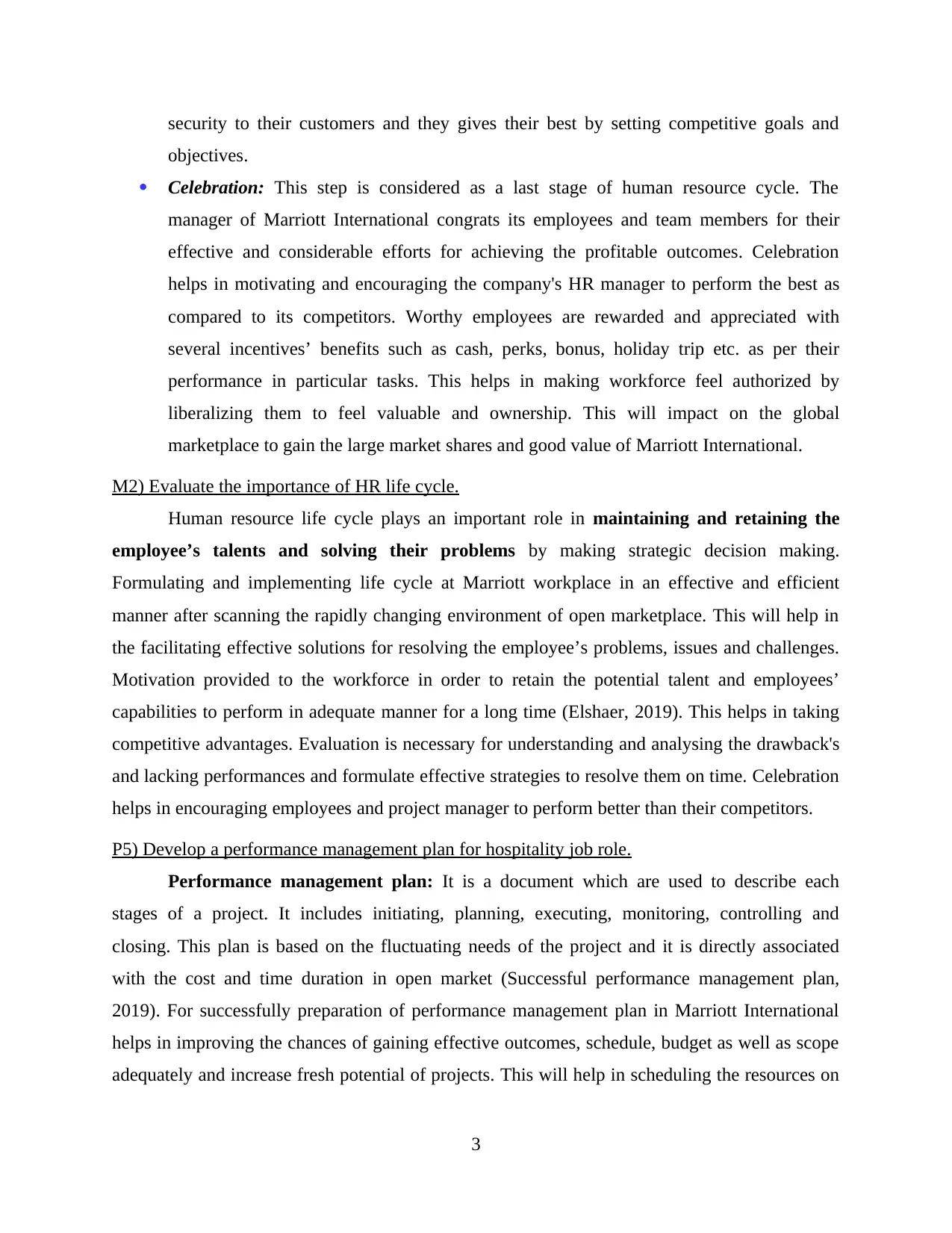
security to their customers and they gives their best by setting competitive goals and
objectives.
Celebration: This step is considered as a last stage of human resource cycle. The
manager of Marriott International congrats its employees and team members for their
effective and considerable efforts for achieving the profitable outcomes. Celebration
helps in motivating and encouraging the company's HR manager to perform the best as
compared to its competitors. Worthy employees are rewarded and appreciated with
several incentives’ benefits such as cash, perks, bonus, holiday trip etc. as per their
performance in particular tasks. This helps in making workforce feel authorized by
liberalizing them to feel valuable and ownership. This will impact on the global
marketplace to gain the large market shares and good value of Marriott International.
M2) Evaluate the importance of HR life cycle.
Human resource life cycle plays an important role in maintaining and retaining the
employee’s talents and solving their problems by making strategic decision making.
Formulating and implementing life cycle at Marriott workplace in an effective and efficient
manner after scanning the rapidly changing environment of open marketplace. This will help in
the facilitating effective solutions for resolving the employee’s problems, issues and challenges.
Motivation provided to the workforce in order to retain the potential talent and employees’
capabilities to perform in adequate manner for a long time (Elshaer, 2019). This helps in taking
competitive advantages. Evaluation is necessary for understanding and analysing the drawback's
and lacking performances and formulate effective strategies to resolve them on time. Celebration
helps in encouraging employees and project manager to perform better than their competitors.
P5) Develop a performance management plan for hospitality job role.
Performance management plan: It is a document which are used to describe each
stages of a project. It includes initiating, planning, executing, monitoring, controlling and
closing. This plan is based on the fluctuating needs of the project and it is directly associated
with the cost and time duration in open market (Successful performance management plan,
2019). For successfully preparation of performance management plan in Marriott International
helps in improving the chances of gaining effective outcomes, schedule, budget as well as scope
adequately and increase fresh potential of projects. This will help in scheduling the resources on
3
objectives.
Celebration: This step is considered as a last stage of human resource cycle. The
manager of Marriott International congrats its employees and team members for their
effective and considerable efforts for achieving the profitable outcomes. Celebration
helps in motivating and encouraging the company's HR manager to perform the best as
compared to its competitors. Worthy employees are rewarded and appreciated with
several incentives’ benefits such as cash, perks, bonus, holiday trip etc. as per their
performance in particular tasks. This helps in making workforce feel authorized by
liberalizing them to feel valuable and ownership. This will impact on the global
marketplace to gain the large market shares and good value of Marriott International.
M2) Evaluate the importance of HR life cycle.
Human resource life cycle plays an important role in maintaining and retaining the
employee’s talents and solving their problems by making strategic decision making.
Formulating and implementing life cycle at Marriott workplace in an effective and efficient
manner after scanning the rapidly changing environment of open marketplace. This will help in
the facilitating effective solutions for resolving the employee’s problems, issues and challenges.
Motivation provided to the workforce in order to retain the potential talent and employees’
capabilities to perform in adequate manner for a long time (Elshaer, 2019). This helps in taking
competitive advantages. Evaluation is necessary for understanding and analysing the drawback's
and lacking performances and formulate effective strategies to resolve them on time. Celebration
helps in encouraging employees and project manager to perform better than their competitors.
P5) Develop a performance management plan for hospitality job role.
Performance management plan: It is a document which are used to describe each
stages of a project. It includes initiating, planning, executing, monitoring, controlling and
closing. This plan is based on the fluctuating needs of the project and it is directly associated
with the cost and time duration in open market (Successful performance management plan,
2019). For successfully preparation of performance management plan in Marriott International
helps in improving the chances of gaining effective outcomes, schedule, budget as well as scope
adequately and increase fresh potential of projects. This will help in scheduling the resources on
3
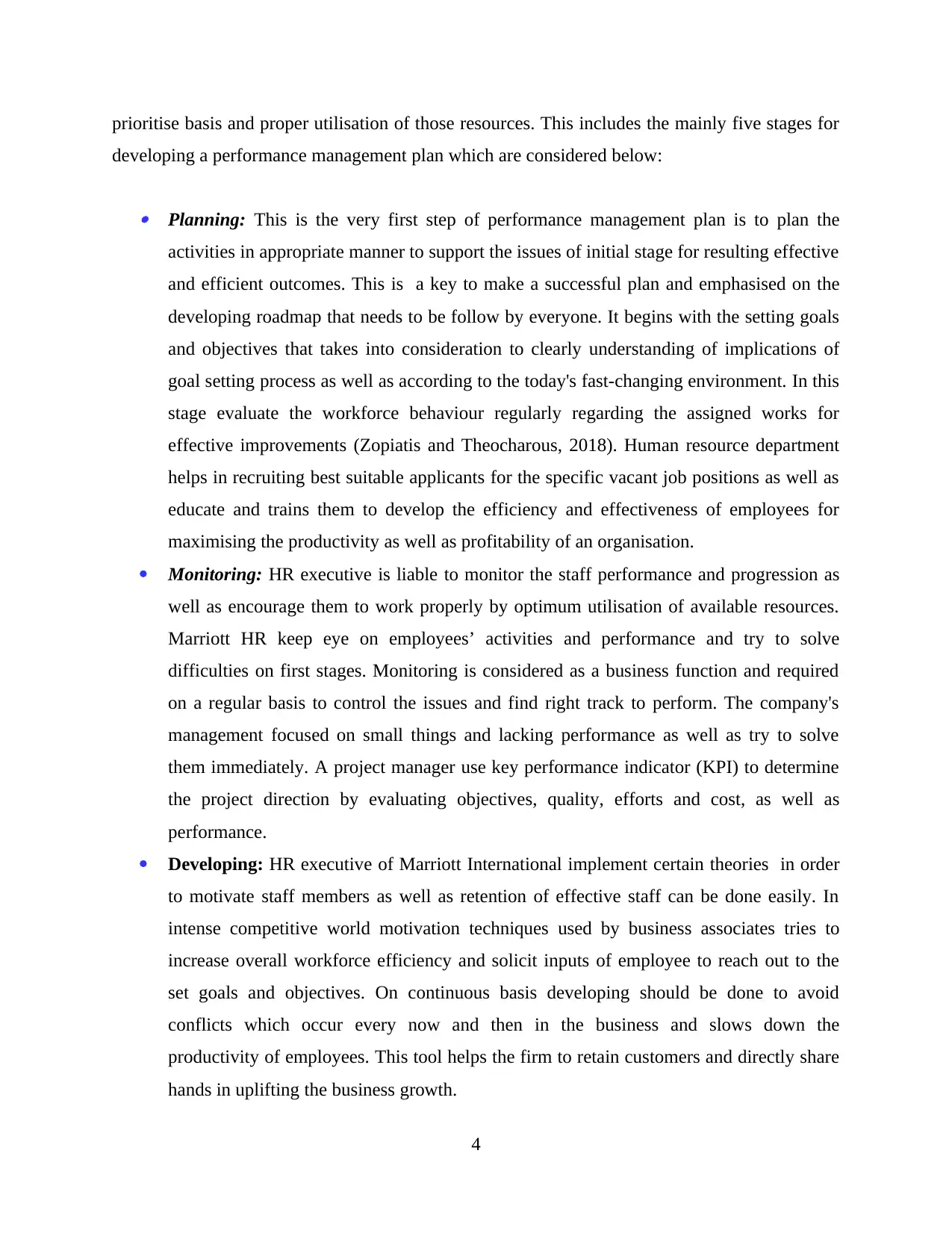
prioritise basis and proper utilisation of those resources. This includes the mainly five stages for
developing a performance management plan which are considered below:
Planning: This is the very first step of performance management plan is to plan the
activities in appropriate manner to support the issues of initial stage for resulting effective
and efficient outcomes. This is a key to make a successful plan and emphasised on the
developing roadmap that needs to be follow by everyone. It begins with the setting goals
and objectives that takes into consideration to clearly understanding of implications of
goal setting process as well as according to the today's fast-changing environment. In this
stage evaluate the workforce behaviour regularly regarding the assigned works for
effective improvements (Zopiatis and Theocharous, 2018). Human resource department
helps in recruiting best suitable applicants for the specific vacant job positions as well as
educate and trains them to develop the efficiency and effectiveness of employees for
maximising the productivity as well as profitability of an organisation.
Monitoring: HR executive is liable to monitor the staff performance and progression as
well as encourage them to work properly by optimum utilisation of available resources.
Marriott HR keep eye on employees’ activities and performance and try to solve
difficulties on first stages. Monitoring is considered as a business function and required
on a regular basis to control the issues and find right track to perform. The company's
management focused on small things and lacking performance as well as try to solve
them immediately. A project manager use key performance indicator (KPI) to determine
the project direction by evaluating objectives, quality, efforts and cost, as well as
performance.
Developing: HR executive of Marriott International implement certain theories in order
to motivate staff members as well as retention of effective staff can be done easily. In
intense competitive world motivation techniques used by business associates tries to
increase overall workforce efficiency and solicit inputs of employee to reach out to the
set goals and objectives. On continuous basis developing should be done to avoid
conflicts which occur every now and then in the business and slows down the
productivity of employees. This tool helps the firm to retain customers and directly share
hands in uplifting the business growth.
4
developing a performance management plan which are considered below:
Planning: This is the very first step of performance management plan is to plan the
activities in appropriate manner to support the issues of initial stage for resulting effective
and efficient outcomes. This is a key to make a successful plan and emphasised on the
developing roadmap that needs to be follow by everyone. It begins with the setting goals
and objectives that takes into consideration to clearly understanding of implications of
goal setting process as well as according to the today's fast-changing environment. In this
stage evaluate the workforce behaviour regularly regarding the assigned works for
effective improvements (Zopiatis and Theocharous, 2018). Human resource department
helps in recruiting best suitable applicants for the specific vacant job positions as well as
educate and trains them to develop the efficiency and effectiveness of employees for
maximising the productivity as well as profitability of an organisation.
Monitoring: HR executive is liable to monitor the staff performance and progression as
well as encourage them to work properly by optimum utilisation of available resources.
Marriott HR keep eye on employees’ activities and performance and try to solve
difficulties on first stages. Monitoring is considered as a business function and required
on a regular basis to control the issues and find right track to perform. The company's
management focused on small things and lacking performance as well as try to solve
them immediately. A project manager use key performance indicator (KPI) to determine
the project direction by evaluating objectives, quality, efforts and cost, as well as
performance.
Developing: HR executive of Marriott International implement certain theories in order
to motivate staff members as well as retention of effective staff can be done easily. In
intense competitive world motivation techniques used by business associates tries to
increase overall workforce efficiency and solicit inputs of employee to reach out to the
set goals and objectives. On continuous basis developing should be done to avoid
conflicts which occur every now and then in the business and slows down the
productivity of employees. This tool helps the firm to retain customers and directly share
hands in uplifting the business growth.
4
⊘ This is a preview!⊘
Do you want full access?
Subscribe today to unlock all pages.

Trusted by 1+ million students worldwide
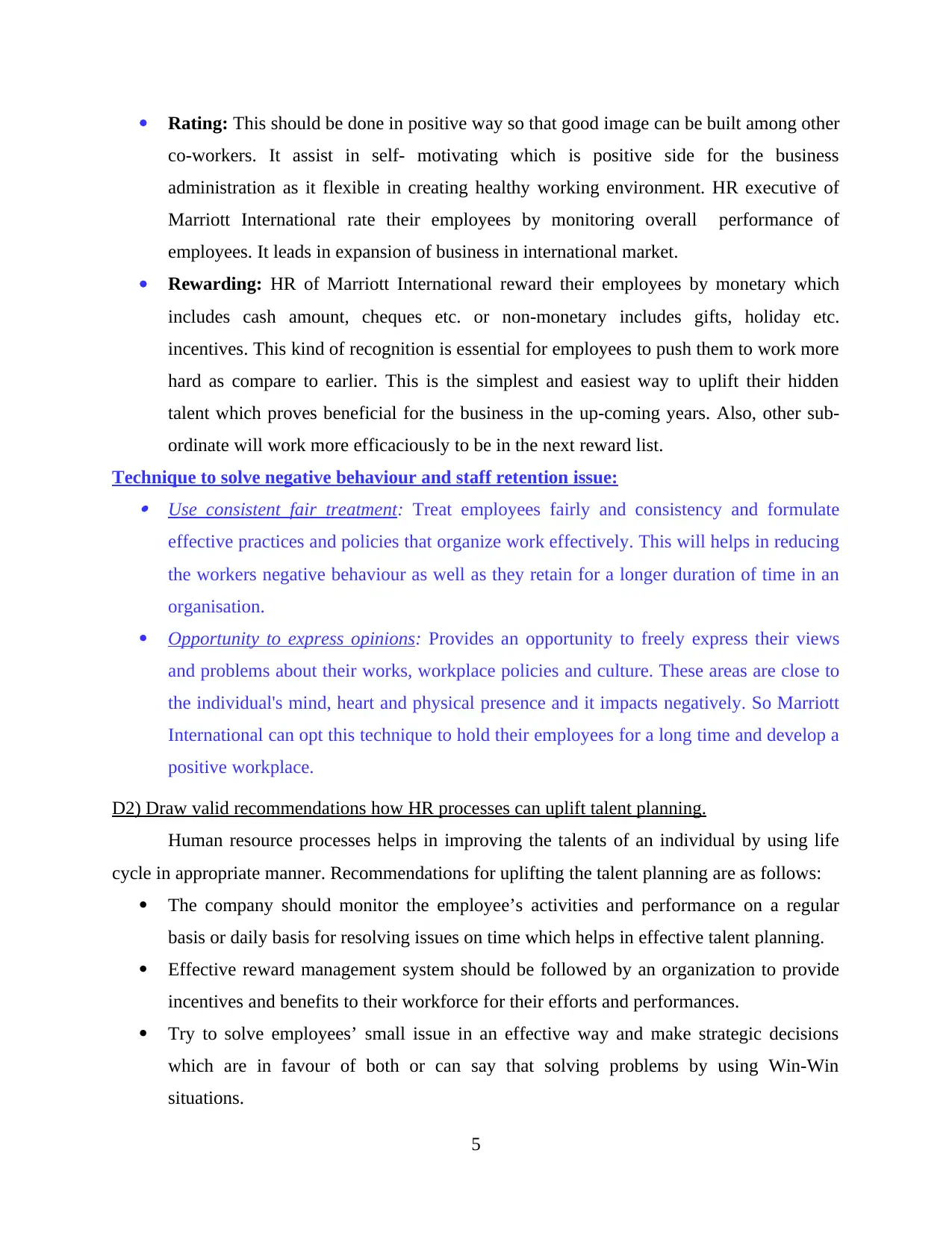
Rating: This should be done in positive way so that good image can be built among other
co-workers. It assist in self- motivating which is positive side for the business
administration as it flexible in creating healthy working environment. HR executive of
Marriott International rate their employees by monitoring overall performance of
employees. It leads in expansion of business in international market.
Rewarding: HR of Marriott International reward their employees by monetary which
includes cash amount, cheques etc. or non-monetary includes gifts, holiday etc.
incentives. This kind of recognition is essential for employees to push them to work more
hard as compare to earlier. This is the simplest and easiest way to uplift their hidden
talent which proves beneficial for the business in the up-coming years. Also, other sub-
ordinate will work more efficaciously to be in the next reward list.
Technique to solve negative behaviour and staff retention issue: Use consistent fair treatment: Treat employees fairly and consistency and formulate
effective practices and policies that organize work effectively. This will helps in reducing
the workers negative behaviour as well as they retain for a longer duration of time in an
organisation.
Opportunity to express opinions: Provides an opportunity to freely express their views
and problems about their works, workplace policies and culture. These areas are close to
the individual's mind, heart and physical presence and it impacts negatively. So Marriott
International can opt this technique to hold their employees for a long time and develop a
positive workplace.
D2) Draw valid recommendations how HR processes can uplift talent planning.
Human resource processes helps in improving the talents of an individual by using life
cycle in appropriate manner. Recommendations for uplifting the talent planning are as follows:
The company should monitor the employee’s activities and performance on a regular
basis or daily basis for resolving issues on time which helps in effective talent planning.
Effective reward management system should be followed by an organization to provide
incentives and benefits to their workforce for their efforts and performances.
Try to solve employees’ small issue in an effective way and make strategic decisions
which are in favour of both or can say that solving problems by using Win-Win
situations.
5
co-workers. It assist in self- motivating which is positive side for the business
administration as it flexible in creating healthy working environment. HR executive of
Marriott International rate their employees by monitoring overall performance of
employees. It leads in expansion of business in international market.
Rewarding: HR of Marriott International reward their employees by monetary which
includes cash amount, cheques etc. or non-monetary includes gifts, holiday etc.
incentives. This kind of recognition is essential for employees to push them to work more
hard as compare to earlier. This is the simplest and easiest way to uplift their hidden
talent which proves beneficial for the business in the up-coming years. Also, other sub-
ordinate will work more efficaciously to be in the next reward list.
Technique to solve negative behaviour and staff retention issue: Use consistent fair treatment: Treat employees fairly and consistency and formulate
effective practices and policies that organize work effectively. This will helps in reducing
the workers negative behaviour as well as they retain for a longer duration of time in an
organisation.
Opportunity to express opinions: Provides an opportunity to freely express their views
and problems about their works, workplace policies and culture. These areas are close to
the individual's mind, heart and physical presence and it impacts negatively. So Marriott
International can opt this technique to hold their employees for a long time and develop a
positive workplace.
D2) Draw valid recommendations how HR processes can uplift talent planning.
Human resource processes helps in improving the talents of an individual by using life
cycle in appropriate manner. Recommendations for uplifting the talent planning are as follows:
The company should monitor the employee’s activities and performance on a regular
basis or daily basis for resolving issues on time which helps in effective talent planning.
Effective reward management system should be followed by an organization to provide
incentives and benefits to their workforce for their efforts and performances.
Try to solve employees’ small issue in an effective way and make strategic decisions
which are in favour of both or can say that solving problems by using Win-Win
situations.
5
Paraphrase This Document
Need a fresh take? Get an instant paraphrase of this document with our AI Paraphraser
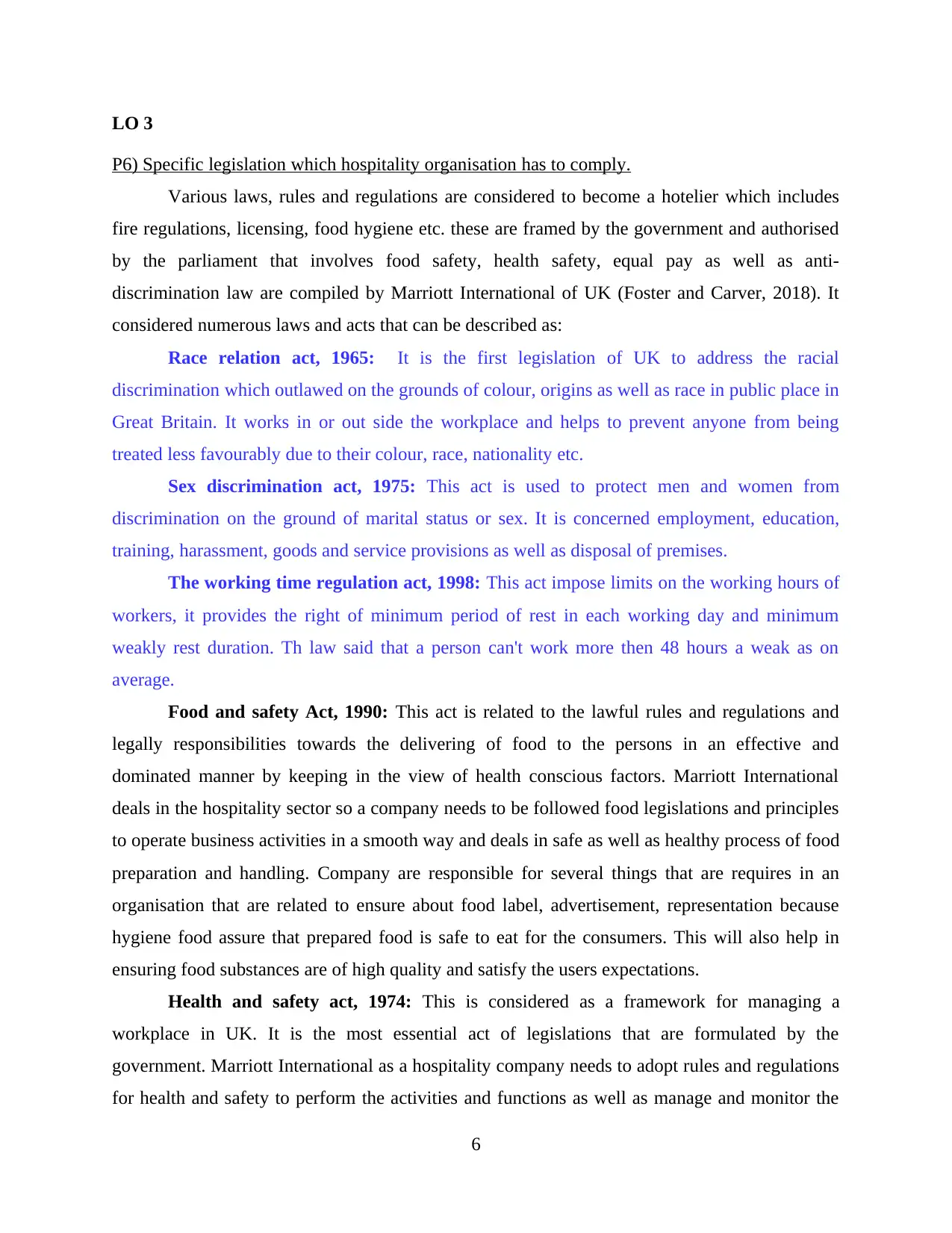
LO 3
P6) Specific legislation which hospitality organisation has to comply.
Various laws, rules and regulations are considered to become a hotelier which includes
fire regulations, licensing, food hygiene etc. these are framed by the government and authorised
by the parliament that involves food safety, health safety, equal pay as well as anti-
discrimination law are compiled by Marriott International of UK (Foster and Carver, 2018). It
considered numerous laws and acts that can be described as:
Race relation act, 1965: It is the first legislation of UK to address the racial
discrimination which outlawed on the grounds of colour, origins as well as race in public place in
Great Britain. It works in or out side the workplace and helps to prevent anyone from being
treated less favourably due to their colour, race, nationality etc.
Sex discrimination act, 1975: This act is used to protect men and women from
discrimination on the ground of marital status or sex. It is concerned employment, education,
training, harassment, goods and service provisions as well as disposal of premises.
The working time regulation act, 1998: This act impose limits on the working hours of
workers, it provides the right of minimum period of rest in each working day and minimum
weakly rest duration. Th law said that a person can't work more then 48 hours a weak as on
average.
Food and safety Act, 1990: This act is related to the lawful rules and regulations and
legally responsibilities towards the delivering of food to the persons in an effective and
dominated manner by keeping in the view of health conscious factors. Marriott International
deals in the hospitality sector so a company needs to be followed food legislations and principles
to operate business activities in a smooth way and deals in safe as well as healthy process of food
preparation and handling. Company are responsible for several things that are requires in an
organisation that are related to ensure about food label, advertisement, representation because
hygiene food assure that prepared food is safe to eat for the consumers. This will also help in
ensuring food substances are of high quality and satisfy the users expectations.
Health and safety act, 1974: This is considered as a framework for managing a
workplace in UK. It is the most essential act of legislations that are formulated by the
government. Marriott International as a hospitality company needs to adopt rules and regulations
for health and safety to perform the activities and functions as well as manage and monitor the
6
P6) Specific legislation which hospitality organisation has to comply.
Various laws, rules and regulations are considered to become a hotelier which includes
fire regulations, licensing, food hygiene etc. these are framed by the government and authorised
by the parliament that involves food safety, health safety, equal pay as well as anti-
discrimination law are compiled by Marriott International of UK (Foster and Carver, 2018). It
considered numerous laws and acts that can be described as:
Race relation act, 1965: It is the first legislation of UK to address the racial
discrimination which outlawed on the grounds of colour, origins as well as race in public place in
Great Britain. It works in or out side the workplace and helps to prevent anyone from being
treated less favourably due to their colour, race, nationality etc.
Sex discrimination act, 1975: This act is used to protect men and women from
discrimination on the ground of marital status or sex. It is concerned employment, education,
training, harassment, goods and service provisions as well as disposal of premises.
The working time regulation act, 1998: This act impose limits on the working hours of
workers, it provides the right of minimum period of rest in each working day and minimum
weakly rest duration. Th law said that a person can't work more then 48 hours a weak as on
average.
Food and safety Act, 1990: This act is related to the lawful rules and regulations and
legally responsibilities towards the delivering of food to the persons in an effective and
dominated manner by keeping in the view of health conscious factors. Marriott International
deals in the hospitality sector so a company needs to be followed food legislations and principles
to operate business activities in a smooth way and deals in safe as well as healthy process of food
preparation and handling. Company are responsible for several things that are requires in an
organisation that are related to ensure about food label, advertisement, representation because
hygiene food assure that prepared food is safe to eat for the consumers. This will also help in
ensuring food substances are of high quality and satisfy the users expectations.
Health and safety act, 1974: This is considered as a framework for managing a
workplace in UK. It is the most essential act of legislations that are formulated by the
government. Marriott International as a hospitality company needs to adopt rules and regulations
for health and safety to perform the activities and functions as well as manage and monitor the
6
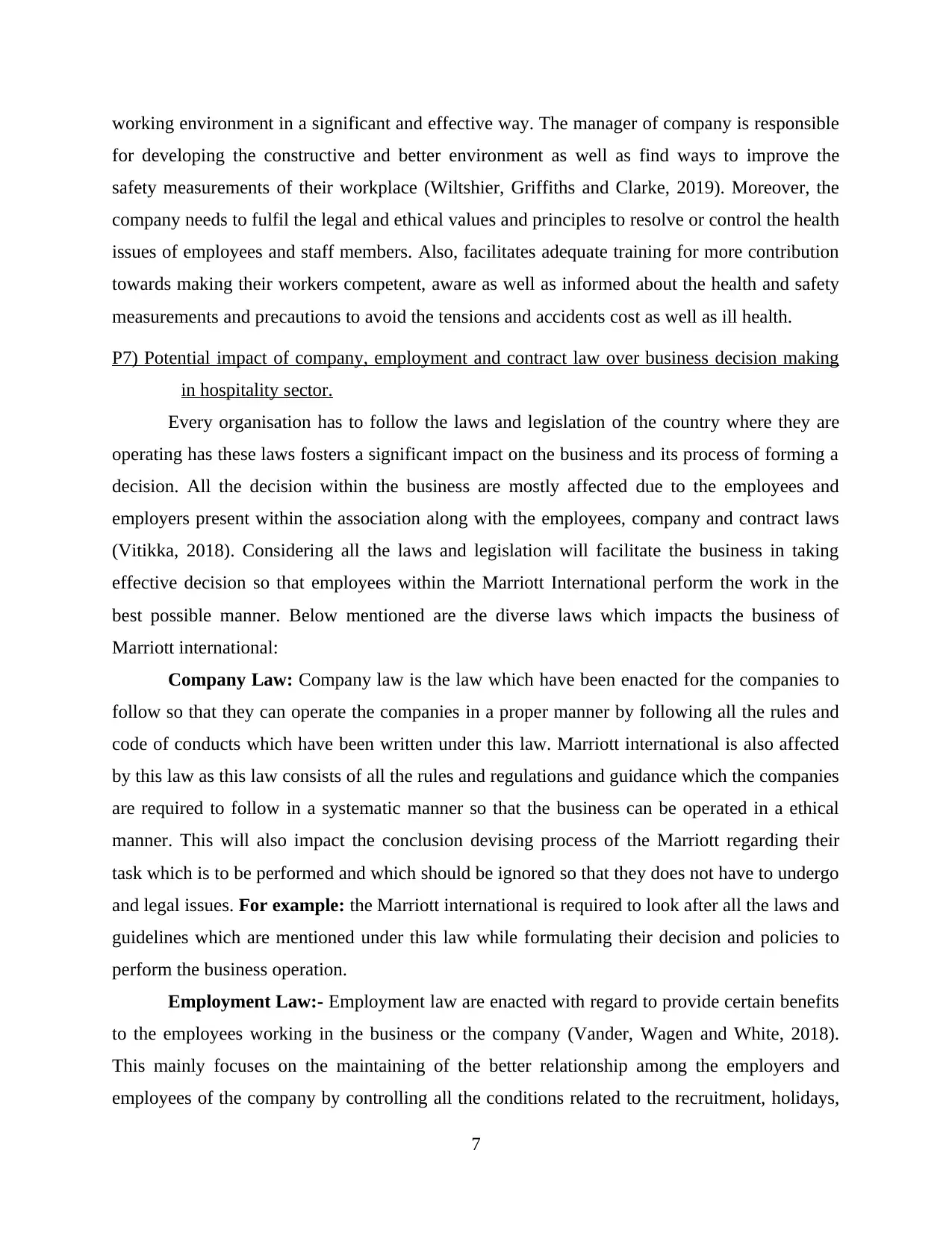
working environment in a significant and effective way. The manager of company is responsible
for developing the constructive and better environment as well as find ways to improve the
safety measurements of their workplace (Wiltshier, Griffiths and Clarke, 2019). Moreover, the
company needs to fulfil the legal and ethical values and principles to resolve or control the health
issues of employees and staff members. Also, facilitates adequate training for more contribution
towards making their workers competent, aware as well as informed about the health and safety
measurements and precautions to avoid the tensions and accidents cost as well as ill health.
P7) Potential impact of company, employment and contract law over business decision making
in hospitality sector.
Every organisation has to follow the laws and legislation of the country where they are
operating has these laws fosters a significant impact on the business and its process of forming a
decision. All the decision within the business are mostly affected due to the employees and
employers present within the association along with the employees, company and contract laws
(Vitikka, 2018). Considering all the laws and legislation will facilitate the business in taking
effective decision so that employees within the Marriott International perform the work in the
best possible manner. Below mentioned are the diverse laws which impacts the business of
Marriott international:
Company Law: Company law is the law which have been enacted for the companies to
follow so that they can operate the companies in a proper manner by following all the rules and
code of conducts which have been written under this law. Marriott international is also affected
by this law as this law consists of all the rules and regulations and guidance which the companies
are required to follow in a systematic manner so that the business can be operated in a ethical
manner. This will also impact the conclusion devising process of the Marriott regarding their
task which is to be performed and which should be ignored so that they does not have to undergo
and legal issues. For example: the Marriott international is required to look after all the laws and
guidelines which are mentioned under this law while formulating their decision and policies to
perform the business operation.
Employment Law:- Employment law are enacted with regard to provide certain benefits
to the employees working in the business or the company (Vander, Wagen and White, 2018).
This mainly focuses on the maintaining of the better relationship among the employers and
employees of the company by controlling all the conditions related to the recruitment, holidays,
7
for developing the constructive and better environment as well as find ways to improve the
safety measurements of their workplace (Wiltshier, Griffiths and Clarke, 2019). Moreover, the
company needs to fulfil the legal and ethical values and principles to resolve or control the health
issues of employees and staff members. Also, facilitates adequate training for more contribution
towards making their workers competent, aware as well as informed about the health and safety
measurements and precautions to avoid the tensions and accidents cost as well as ill health.
P7) Potential impact of company, employment and contract law over business decision making
in hospitality sector.
Every organisation has to follow the laws and legislation of the country where they are
operating has these laws fosters a significant impact on the business and its process of forming a
decision. All the decision within the business are mostly affected due to the employees and
employers present within the association along with the employees, company and contract laws
(Vitikka, 2018). Considering all the laws and legislation will facilitate the business in taking
effective decision so that employees within the Marriott International perform the work in the
best possible manner. Below mentioned are the diverse laws which impacts the business of
Marriott international:
Company Law: Company law is the law which have been enacted for the companies to
follow so that they can operate the companies in a proper manner by following all the rules and
code of conducts which have been written under this law. Marriott international is also affected
by this law as this law consists of all the rules and regulations and guidance which the companies
are required to follow in a systematic manner so that the business can be operated in a ethical
manner. This will also impact the conclusion devising process of the Marriott regarding their
task which is to be performed and which should be ignored so that they does not have to undergo
and legal issues. For example: the Marriott international is required to look after all the laws and
guidelines which are mentioned under this law while formulating their decision and policies to
perform the business operation.
Employment Law:- Employment law are enacted with regard to provide certain benefits
to the employees working in the business or the company (Vander, Wagen and White, 2018).
This mainly focuses on the maintaining of the better relationship among the employers and
employees of the company by controlling all the conditions related to the recruitment, holidays,
7
⊘ This is a preview!⊘
Do you want full access?
Subscribe today to unlock all pages.

Trusted by 1+ million students worldwide
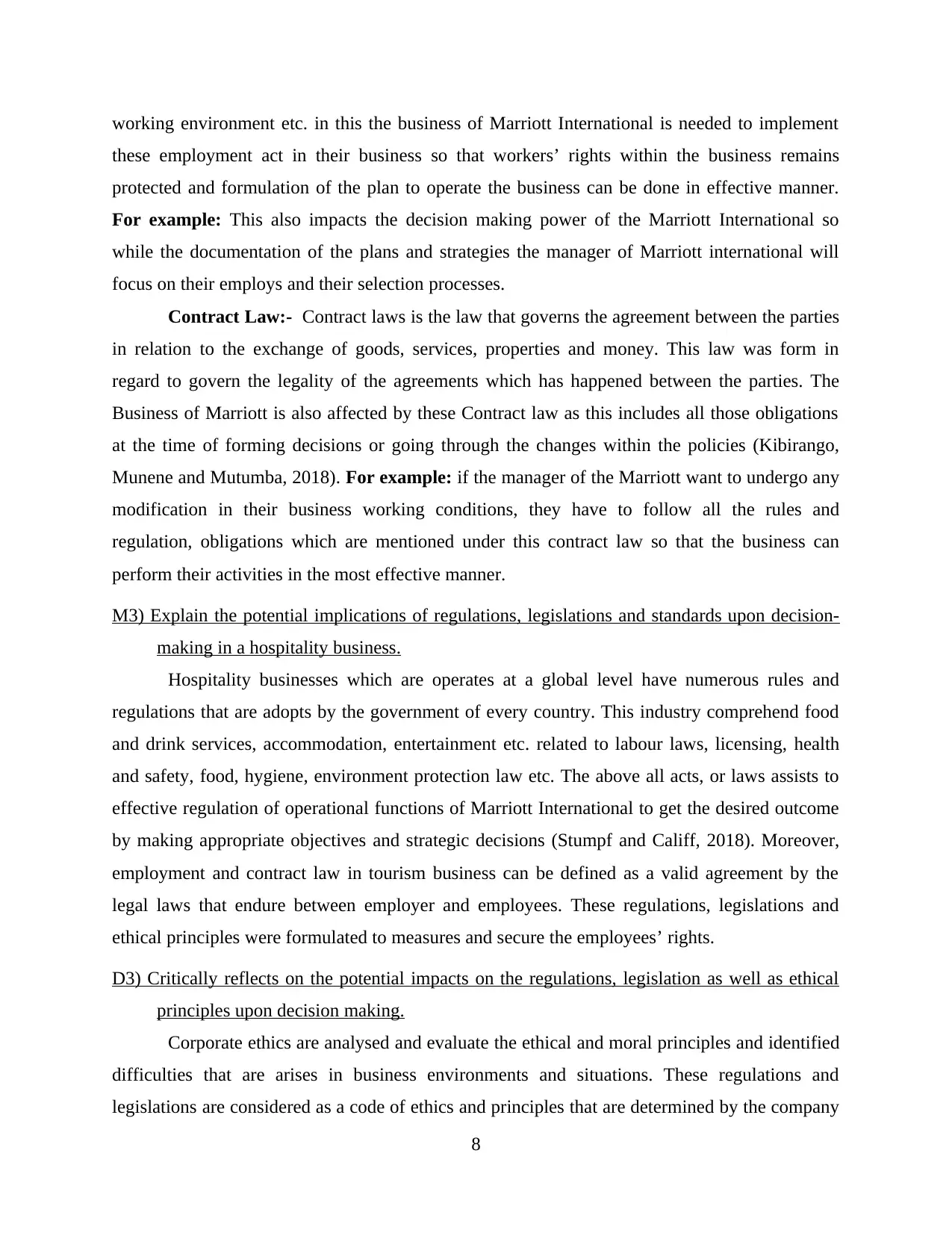
working environment etc. in this the business of Marriott International is needed to implement
these employment act in their business so that workers’ rights within the business remains
protected and formulation of the plan to operate the business can be done in effective manner.
For example: This also impacts the decision making power of the Marriott International so
while the documentation of the plans and strategies the manager of Marriott international will
focus on their employs and their selection processes.
Contract Law:- Contract laws is the law that governs the agreement between the parties
in relation to the exchange of goods, services, properties and money. This law was form in
regard to govern the legality of the agreements which has happened between the parties. The
Business of Marriott is also affected by these Contract law as this includes all those obligations
at the time of forming decisions or going through the changes within the policies (Kibirango,
Munene and Mutumba, 2018). For example: if the manager of the Marriott want to undergo any
modification in their business working conditions, they have to follow all the rules and
regulation, obligations which are mentioned under this contract law so that the business can
perform their activities in the most effective manner.
M3) Explain the potential implications of regulations, legislations and standards upon decision-
making in a hospitality business.
Hospitality businesses which are operates at a global level have numerous rules and
regulations that are adopts by the government of every country. This industry comprehend food
and drink services, accommodation, entertainment etc. related to labour laws, licensing, health
and safety, food, hygiene, environment protection law etc. The above all acts, or laws assists to
effective regulation of operational functions of Marriott International to get the desired outcome
by making appropriate objectives and strategic decisions (Stumpf and Califf, 2018). Moreover,
employment and contract law in tourism business can be defined as a valid agreement by the
legal laws that endure between employer and employees. These regulations, legislations and
ethical principles were formulated to measures and secure the employees’ rights.
D3) Critically reflects on the potential impacts on the regulations, legislation as well as ethical
principles upon decision making.
Corporate ethics are analysed and evaluate the ethical and moral principles and identified
difficulties that are arises in business environments and situations. These regulations and
legislations are considered as a code of ethics and principles that are determined by the company
8
these employment act in their business so that workers’ rights within the business remains
protected and formulation of the plan to operate the business can be done in effective manner.
For example: This also impacts the decision making power of the Marriott International so
while the documentation of the plans and strategies the manager of Marriott international will
focus on their employs and their selection processes.
Contract Law:- Contract laws is the law that governs the agreement between the parties
in relation to the exchange of goods, services, properties and money. This law was form in
regard to govern the legality of the agreements which has happened between the parties. The
Business of Marriott is also affected by these Contract law as this includes all those obligations
at the time of forming decisions or going through the changes within the policies (Kibirango,
Munene and Mutumba, 2018). For example: if the manager of the Marriott want to undergo any
modification in their business working conditions, they have to follow all the rules and
regulation, obligations which are mentioned under this contract law so that the business can
perform their activities in the most effective manner.
M3) Explain the potential implications of regulations, legislations and standards upon decision-
making in a hospitality business.
Hospitality businesses which are operates at a global level have numerous rules and
regulations that are adopts by the government of every country. This industry comprehend food
and drink services, accommodation, entertainment etc. related to labour laws, licensing, health
and safety, food, hygiene, environment protection law etc. The above all acts, or laws assists to
effective regulation of operational functions of Marriott International to get the desired outcome
by making appropriate objectives and strategic decisions (Stumpf and Califf, 2018). Moreover,
employment and contract law in tourism business can be defined as a valid agreement by the
legal laws that endure between employer and employees. These regulations, legislations and
ethical principles were formulated to measures and secure the employees’ rights.
D3) Critically reflects on the potential impacts on the regulations, legislation as well as ethical
principles upon decision making.
Corporate ethics are analysed and evaluate the ethical and moral principles and identified
difficulties that are arises in business environments and situations. These regulations and
legislations are considered as a code of ethics and principles that are determined by the company
8
Paraphrase This Document
Need a fresh take? Get an instant paraphrase of this document with our AI Paraphraser
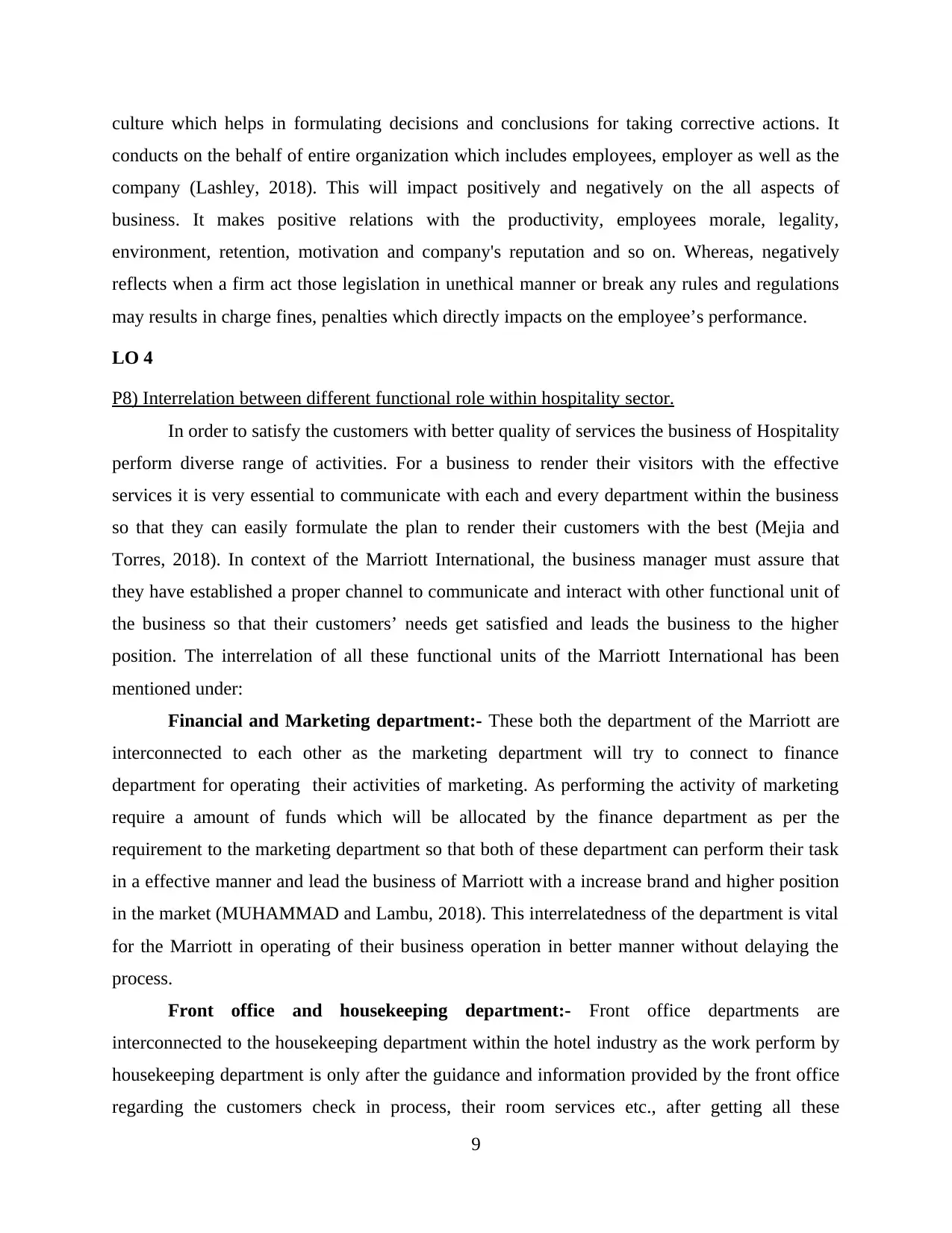
culture which helps in formulating decisions and conclusions for taking corrective actions. It
conducts on the behalf of entire organization which includes employees, employer as well as the
company (Lashley, 2018). This will impact positively and negatively on the all aspects of
business. It makes positive relations with the productivity, employees morale, legality,
environment, retention, motivation and company's reputation and so on. Whereas, negatively
reflects when a firm act those legislation in unethical manner or break any rules and regulations
may results in charge fines, penalties which directly impacts on the employee’s performance.
LO 4
P8) Interrelation between different functional role within hospitality sector.
In order to satisfy the customers with better quality of services the business of Hospitality
perform diverse range of activities. For a business to render their visitors with the effective
services it is very essential to communicate with each and every department within the business
so that they can easily formulate the plan to render their customers with the best (Mejia and
Torres, 2018). In context of the Marriott International, the business manager must assure that
they have established a proper channel to communicate and interact with other functional unit of
the business so that their customers’ needs get satisfied and leads the business to the higher
position. The interrelation of all these functional units of the Marriott International has been
mentioned under:
Financial and Marketing department:- These both the department of the Marriott are
interconnected to each other as the marketing department will try to connect to finance
department for operating their activities of marketing. As performing the activity of marketing
require a amount of funds which will be allocated by the finance department as per the
requirement to the marketing department so that both of these department can perform their task
in a effective manner and lead the business of Marriott with a increase brand and higher position
in the market (MUHAMMAD and Lambu, 2018). This interrelatedness of the department is vital
for the Marriott in operating of their business operation in better manner without delaying the
process.
Front office and housekeeping department:- Front office departments are
interconnected to the housekeeping department within the hotel industry as the work perform by
housekeeping department is only after the guidance and information provided by the front office
regarding the customers check in process, their room services etc., after getting all these
9
conducts on the behalf of entire organization which includes employees, employer as well as the
company (Lashley, 2018). This will impact positively and negatively on the all aspects of
business. It makes positive relations with the productivity, employees morale, legality,
environment, retention, motivation and company's reputation and so on. Whereas, negatively
reflects when a firm act those legislation in unethical manner or break any rules and regulations
may results in charge fines, penalties which directly impacts on the employee’s performance.
LO 4
P8) Interrelation between different functional role within hospitality sector.
In order to satisfy the customers with better quality of services the business of Hospitality
perform diverse range of activities. For a business to render their visitors with the effective
services it is very essential to communicate with each and every department within the business
so that they can easily formulate the plan to render their customers with the best (Mejia and
Torres, 2018). In context of the Marriott International, the business manager must assure that
they have established a proper channel to communicate and interact with other functional unit of
the business so that their customers’ needs get satisfied and leads the business to the higher
position. The interrelation of all these functional units of the Marriott International has been
mentioned under:
Financial and Marketing department:- These both the department of the Marriott are
interconnected to each other as the marketing department will try to connect to finance
department for operating their activities of marketing. As performing the activity of marketing
require a amount of funds which will be allocated by the finance department as per the
requirement to the marketing department so that both of these department can perform their task
in a effective manner and lead the business of Marriott with a increase brand and higher position
in the market (MUHAMMAD and Lambu, 2018). This interrelatedness of the department is vital
for the Marriott in operating of their business operation in better manner without delaying the
process.
Front office and housekeeping department:- Front office departments are
interconnected to the housekeeping department within the hotel industry as the work perform by
housekeeping department is only after the guidance and information provided by the front office
regarding the customers check in process, their room services etc., after getting all these
9
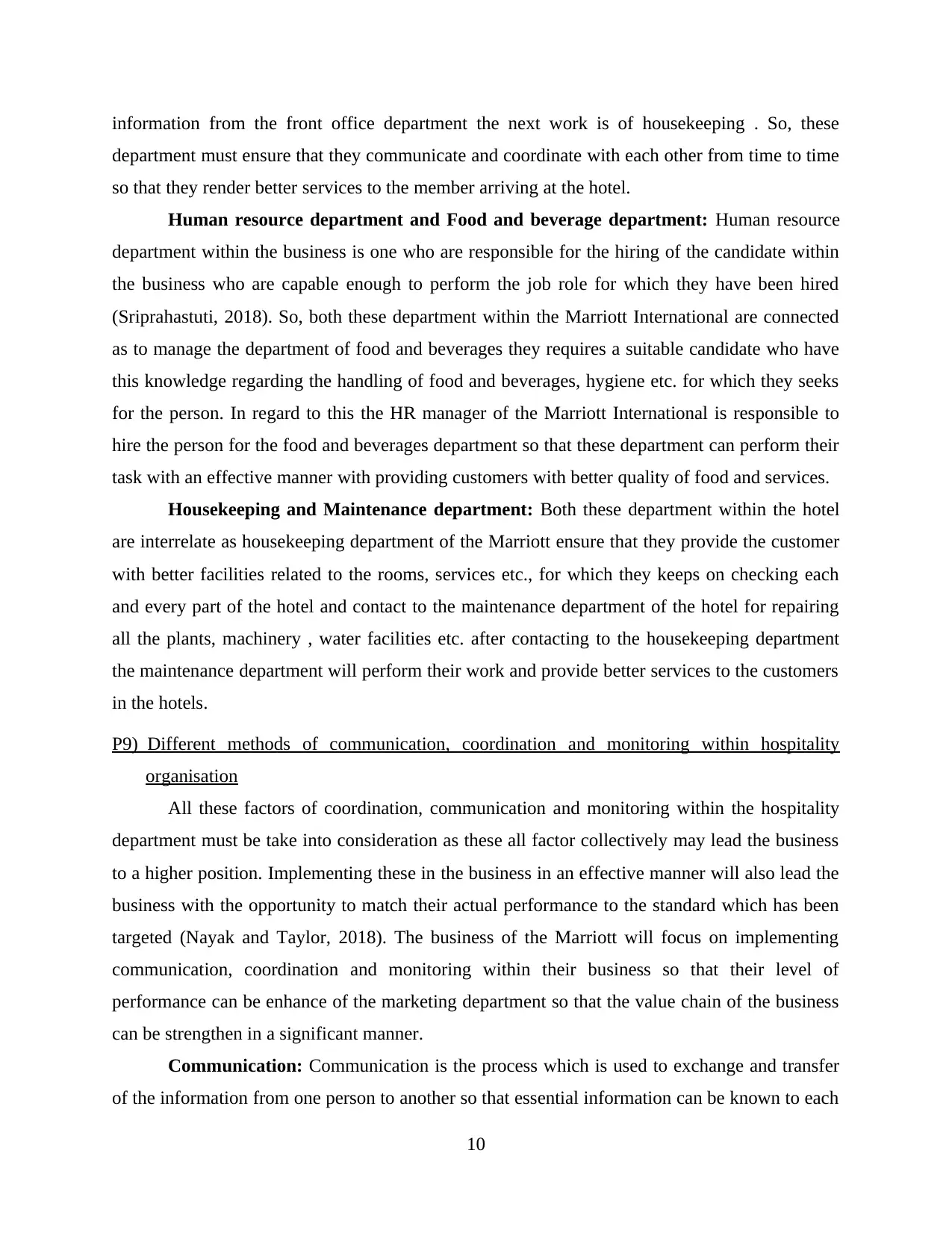
information from the front office department the next work is of housekeeping . So, these
department must ensure that they communicate and coordinate with each other from time to time
so that they render better services to the member arriving at the hotel.
Human resource department and Food and beverage department: Human resource
department within the business is one who are responsible for the hiring of the candidate within
the business who are capable enough to perform the job role for which they have been hired
(Sriprahastuti, 2018). So, both these department within the Marriott International are connected
as to manage the department of food and beverages they requires a suitable candidate who have
this knowledge regarding the handling of food and beverages, hygiene etc. for which they seeks
for the person. In regard to this the HR manager of the Marriott International is responsible to
hire the person for the food and beverages department so that these department can perform their
task with an effective manner with providing customers with better quality of food and services.
Housekeeping and Maintenance department: Both these department within the hotel
are interrelate as housekeeping department of the Marriott ensure that they provide the customer
with better facilities related to the rooms, services etc., for which they keeps on checking each
and every part of the hotel and contact to the maintenance department of the hotel for repairing
all the plants, machinery , water facilities etc. after contacting to the housekeeping department
the maintenance department will perform their work and provide better services to the customers
in the hotels.
P9)_Different methods of communication, coordination and monitoring within hospitality
organisation
All these factors of coordination, communication and monitoring within the hospitality
department must be take into consideration as these all factor collectively may lead the business
to a higher position. Implementing these in the business in an effective manner will also lead the
business with the opportunity to match their actual performance to the standard which has been
targeted (Nayak and Taylor, 2018). The business of the Marriott will focus on implementing
communication, coordination and monitoring within their business so that their level of
performance can be enhance of the marketing department so that the value chain of the business
can be strengthen in a significant manner.
Communication: Communication is the process which is used to exchange and transfer
of the information from one person to another so that essential information can be known to each
10
department must ensure that they communicate and coordinate with each other from time to time
so that they render better services to the member arriving at the hotel.
Human resource department and Food and beverage department: Human resource
department within the business is one who are responsible for the hiring of the candidate within
the business who are capable enough to perform the job role for which they have been hired
(Sriprahastuti, 2018). So, both these department within the Marriott International are connected
as to manage the department of food and beverages they requires a suitable candidate who have
this knowledge regarding the handling of food and beverages, hygiene etc. for which they seeks
for the person. In regard to this the HR manager of the Marriott International is responsible to
hire the person for the food and beverages department so that these department can perform their
task with an effective manner with providing customers with better quality of food and services.
Housekeeping and Maintenance department: Both these department within the hotel
are interrelate as housekeeping department of the Marriott ensure that they provide the customer
with better facilities related to the rooms, services etc., for which they keeps on checking each
and every part of the hotel and contact to the maintenance department of the hotel for repairing
all the plants, machinery , water facilities etc. after contacting to the housekeeping department
the maintenance department will perform their work and provide better services to the customers
in the hotels.
P9)_Different methods of communication, coordination and monitoring within hospitality
organisation
All these factors of coordination, communication and monitoring within the hospitality
department must be take into consideration as these all factor collectively may lead the business
to a higher position. Implementing these in the business in an effective manner will also lead the
business with the opportunity to match their actual performance to the standard which has been
targeted (Nayak and Taylor, 2018). The business of the Marriott will focus on implementing
communication, coordination and monitoring within their business so that their level of
performance can be enhance of the marketing department so that the value chain of the business
can be strengthen in a significant manner.
Communication: Communication is the process which is used to exchange and transfer
of the information from one person to another so that essential information can be known to each
10
⊘ This is a preview!⊘
Do you want full access?
Subscribe today to unlock all pages.

Trusted by 1+ million students worldwide
1 out of 18
Related Documents
Your All-in-One AI-Powered Toolkit for Academic Success.
+13062052269
info@desklib.com
Available 24*7 on WhatsApp / Email
![[object Object]](/_next/static/media/star-bottom.7253800d.svg)
Unlock your academic potential
Copyright © 2020–2026 A2Z Services. All Rights Reserved. Developed and managed by ZUCOL.





